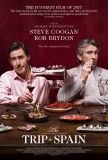The Trip to Spain Movie Review
 |
The Trip to Spain
US Theatrical Release: August 11, 2017 / Running Time: 111 Minutes / Rating: Not Rated Director: Michael Winterbottom Cast: Steve Coogan (Steve), Rob Brydon (Rob), Rebecca Johnson (Sally), Claire Keelan (Emma), Marta Barrio (Yolanda), Margo Stilley (Mischa), Kyle Soller (Jonathan), Justin Edwards (UK Agent), Kerry Shale (Matt), Tom Clegg (), Tim Leach (Joe) |
When people lament the number of sequels being made by the film industry today, they're not talking about something like The Trip to Spain. Yes, this is a threequel, the third entry in a series Coogan, a comic icon in his home nation for the character of Alan Partridge and less enduring creations, should be familiar to American audiences for starring in the Oscar-nominated 2013 drama Philomena or for his supporting roles in the Night at the Museum series, Tropic Thunder, and The Other Guys. Though less recognizable, Brydon has acted in such tentpoles as 2015's Cinderella and 2016's The Huntsman: Winter's War.
There is no departing from the formula here. Like its predecessors, Spain is edited together from a six-episode series that aired on British television a few months earlier. The two actors are again on assignment to travel and taste. This time, they're taking in the food, sights, and culture of Spain. But that hardly keeps this feeling from a straight extension of their past excursions around England and Italy.
The two actors are in their early 50s now, but rather than aging jokes, we repeatedly hear them insisting they are in their primes, There isn't much attention paid to the small-portioned, high-priced plates being enjoyed. Instead, Coogan and Brydon give us more of their impression duels, most extensively Marlon Brando in a hotel where he played a Spanish inquisitor in the ill-received, long-forgotten Christopher Columbus: The Discovery. That scene makes room for Coogan's Robert De Niro and Brydon's oft-employed Woody Allen and even gives way to a dream sequence, one of the more fanciful turns in the film.
Grounding the extravagant meals and barrage of impressions (which also include Brydon's obnoxiously prolonged Roger Moore interrupting Coogan's historical discussion of the Moors) are real life issues, all of which per tradition are inventions of the uncredited, mostly non-existent screenplay. Coogan's 20-year-old son has to cancel joining him after his girlfriend gets pregnant. In addition, Coogan's agent leaves, reassigning him to some young, unproven lackey who isn't fighting a studio's hiring of an up and comer to rewrite Coogan's "sister" project to Philomena.
At nearly two hours, Spain does start to test one's patience as the novelty of the concept wears thin and the number of unfamiliar references grows higher. Its closing sequence is an unpredictable puzzle, one that's sort of in line with the Don Quixote motif that runs throughout the film. Does it signal the end of this saga? Perhaps. I don't think anyone foresaw this reaching "saga" status with the first two movies grossing less than $3 million each in North America. It's clearly a low-risk, low-reward enterprise, a creative outlet and appetizing vacation for the two leads and the smallest of gambles for US distributor IFC Films.
The Trip to Spain is not conventionally satisfying cinema, but its conventions remain a breezy and enjoyable departure from the rest of modern cinema.
|
Related Reviews:
DVDizzy.com | DVD and Blu-ray Reviews | New and Upcoming DVD & Blu-ray Schedule | Upcoming Cover Art | Search This Site
DVDizzy.com Top Stories:
The Trip to Italy • Before Midnight • A Bigger Splash • My Dinner with Andre
Now in Theaters: Logan Lucky • Wind River • The Only Living Boy in New York
Steve Coogan: Philomena • Coffee and Cigarettes • Tropic Thunder • Night at the Museum • Ruby Sparks • Our Idiot Brother
Rob Brydon: Cinderella (2015)
Text copyright 2017 DVDizzy.com. Images copyright 2017 IFC Films, Revolution Films, Baby Cow Productions, Small Man, and Sky.
Unauthorized reproduction prohibited.
